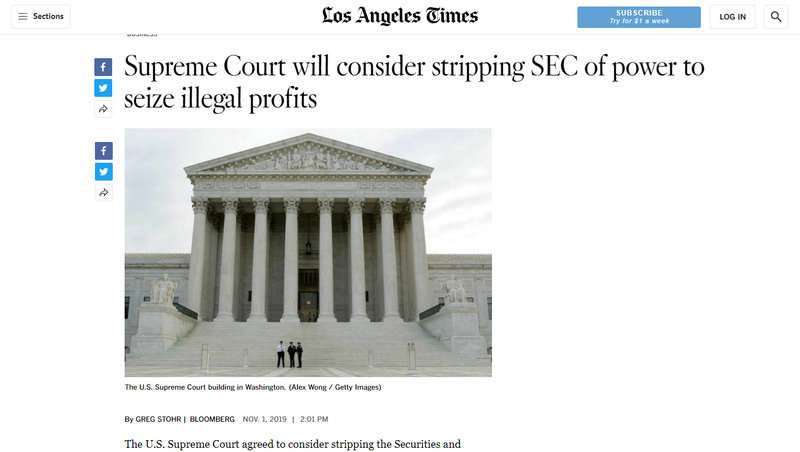Supreme Court will consider stripping SEC of power to seize illegal profits
The U.S. Supreme Court building in Washington.
The U.S. Supreme Court agreed to consider stripping the Securities and Exchange Commission of its power to recoup illegal profits from wrongdoers, taking up a challenge to one of the agency’s most potent legal weapons.
The appeal by Charles Liu and Xin Wang contends that “disgorgement” isn’t one of the remedies Congress has authorized the SEC to seek against people who violate the nation’s securities fraud laws. The California couple is fighting a $27-million disgorgement order.
Liu and Wang were found to have defrauded people seeking to take advantage of the EB-5 visa program for foreigners who make large investments in the U.S. The two were accused of falsely telling investors the money would be used for a cancer treatment center. A federal judge ordered the couple to return $27 million they had collected.
In total, the SEC won disgorgement orders totaling $2.5 billion in fiscal 2018, compared with $1.4 billion in other types of penalties.
Disgorgement is designed to return ill-gotten gains to people who were harmed. Courts have traditionally viewed it as an “equitable” measure, which means judges make awards based on fairness rather than strict legal rules.
The 2002 Sarbanes-Oxley Act says judges hearing SEC enforcement actions can award “any equitable relief” they deem appropriate for the protection of investors.
But Liu and Wang’s attorneys say the SEC has sought so much money through disgorgement that it’s become a punitive measure, much like a penalty.
“The SEC collects huge sums of money by pursuing a penalty that it does not have the power to seek in federal court,” the appeal argued.
Liu and Wang point to a 2017 Supreme Court decision that said disgorgement is covered by a five-year statute of limitations that applies to penalties. That ruling explicitly declined to say whether the SEC has power to seek disgorgement in the first place.
The Trump administration and the SEC urged the Supreme Court to reject the appeal, saying Congress authorized the commission to seek disgorgement in three separate statutes. The administration told the justices that the Supreme Court “has repeatedly characterized disgorgement as an equitable remedy.”
Mentions
Litigation Cases
States
- California
Securities Disclaimer
This website is for informational purposes only and does not constitute an offer or solicitation to sell shares or securities. Any such offer or solicitation will be made only by means of an investment's confidential Offering Memorandum and in accordance with the terms of all applicable securities and other laws. This website does not constitute or form part of, and should not be construed as, any offer for sale or subscription of, or any invitation to offer to buy or subscribe for, any securities, nor should it or any part of it form the basis of, or be relied on in any connection with, any contract or commitment whatsoever. EB5Projects.com LLC and its affiliates expressly disclaim any and all responsibility for any direct or consequential loss or damage of any kind whatsoever arising directly or indirectly from: (i) reliance on any information contained in the website, (ii) any error, omission or inaccuracy in any such information or (iii) any action resulting therefrom.




